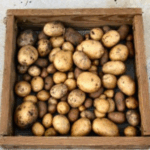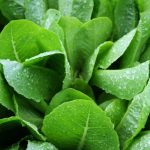Do you want to know a surefire way to tell whether or not your organic gardening practices are working? Among the best signs of soil health are earthworms.
I was doing some fall garden cleanup today in the perennial garden. For those of you new to my blog, the perennial garden was planted on a steep slope along our driveway in 2008. Before I planted shrubs and perennials, the area was planted with pine trees; prior to pines, it was a tobacco farm and hay-field at some point. The soil is thick, compacted clay, and our home’s water well is dug in the center of the area, making the soil even worse in a radius around the well from the heavy equipment and drills that were used.
To get an idea of just how ugly the soil situation was, when we bought the land and had it cleared, I took soil samples back from Virginia to a garden center in New York near where I was living to have the soil tested. The laboratory results showed NO biological life in the soil such low soil fertility that the lab technician who I spoke with said, only half-jokingly, “Where did this sample come from? The moon?”
Tobacco farming requires heavy use of pesticides and I am told it strips the soil of many valuable nutrients. So yes, in a way, this land had about the same soil fertility as the moon. Maybe less, I don’t know. All I know is that I had no idea what to do about fixing the problem at a new house in an area right over my drinking water supply.
Organic gardening practices seemed like the safest way to go given the area’s proximity to my water supply. So chemical fertilizers were out. I bought a package of soil microbes from Gardens Alive!, and even though I wasn’t sure why I need them, I thought it was a good idea. My gut instinct, and maybe all those biology classes I’ve taken through the years, prompted me to think, “Yes, bacteria. Life. This soil needs life.”
So I added the bacteria, then horse manure, then compost, and then we planted a few things, and added a thick layer of hardwood mulch. Each year, we add more mulch. This year, I dug in mushroom soil and compost in a newly revised planting area.
Today as I was weeding near the creeping juniper, I pulled out a huge clump of tall Johnson grass gone to seed. Up popped a juicy, fat earthworm from the hole left by the grass in my hand.
I could have cried with happiness.
You see, earthworms are a sure sign that you soil is healthy again. Earthworms are at the top of what’s called the soil food web. It’s an intricate system of bacteria, protozoa, fungi, arthropods such as beetles and spiders, and yes, earthworms. Earthworms are the largest species in the soil-food web that live underground. When you see a colony of earthworms, they are finding plenty to eat because the rest of the soil web is health. Each population is doing its job well, feeding the next largest organisms and so on until Mr. Earthworm comes along and finds plenty of material to munch on. His poop, called worm castings, are a bacteria-rich fertilizer that also adds health back into the soil
Isn’t nature amazing? Wonderful? Gorgeous?
I crooned to the little earthworm, “Well hello, lovely one!” I watched as this fellow, a dark gray, wriggled into the hole next to the head of another peeking out. As a kindness to them both, I sprinkled a little soil off of the roots of the grass I had just pulled out over them, hiding them from the crows forever stalking about my lawn in search of grubs.
It was a wonderful moment that made this organic gardener happy. It reinforced my methods of gardening, which, while messy, work.
Here’s to earthworms, signs of soil health!






[…] Fortunately, using hardwood mulch can replenish the soil. It breaks down just like a fallen tree would in the forest, and the plant materials turn into lovely compost, which feeds the soil. After 10 years of this, I can actually find worms in my front garden. Hurray for worms! […]